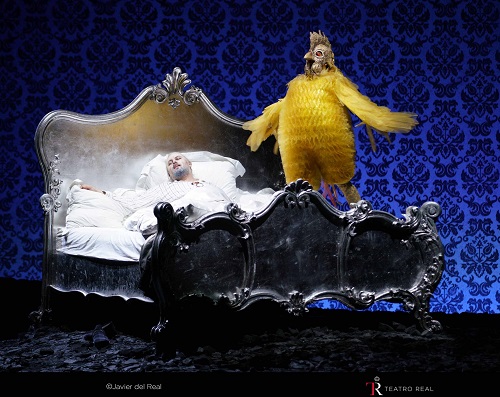 Spain Rimsky-Korsakov, The Golden Cockerel: Orchestra and Chorus of Teatro Real / Ivor Bolton (conductor), Teatro Real, Madrid, 31.5.2017 & 1.6.2017. (JMI)
Spain Rimsky-Korsakov, The Golden Cockerel: Orchestra and Chorus of Teatro Real / Ivor Bolton (conductor), Teatro Real, Madrid, 31.5.2017 & 1.6.2017. (JMI)

Casts:
Tsar Dodon – Dmitry Ulyanov/Alexey Tikhomirov
Tsaritsa of Shemakha – Venera Gimadieva/Nina Minasyan
General Polkan – Alexander Vinogradov
Amelfa – Olesya Petrova/Agnes Zwierko
Astrologer – Alexander Kravets/Barry Banks
Zarevich Guidon – Sergei Skorokhodov/Boris Rudak
Zarevich Afron – Alexey Lavrov/Iurii Samoilov
Golden Cockerel – Sara Blanch
New Production:
Teatro Real, La Monnaie, and Lorraine National Opera
Director – Laurent Pelly (original), Benoît de Leersnyder (revival)
Sets – Barbara de Limburg
Costumes – Laurent Pelly
Lighting – Joël Adam
This Nikolai Rimsky-Korsakov work has finally reached the stage of the Teatro Real after a delay of more than 100 years (the Spanish premiere took place in Barcelona’s Liceu in November 1944). Based on a poem by Alexander Pushkin, it draws a parallel between Tsar Nicholas II and the fictional Tsar Dodon. The plot and the beginnings of the 1905 Russian Revolution meant that, due to strict censorship, the composer could not see it during his lifetime. It saw the light of day in Moscow in 1909, a few months after the death of the composer.
The Laurent Pelly production works well, although it is more satire than comedy. The sets are simple: the stage is covered with small stones, where Tsar Dodon’s big bed is placed in Act I. In the second act we are on a battlefield, where a series of wire fences represent the tent of the Tsarina. Act III returns to the big bed, but this time it is placed on top of a tank. The prologue and epilogue are sung by the Astrologer before a closed curtain.
What stands out is the stage direction by Laurent Pelly, who does a remarkable job with soloists, chorus and extras. It’s a fun production, particularly at the end of the first act, when Tsar Dodon decides to go on horseback to the scene of the war.
The music direction was in the hands of Ivor Bolton, which was surprising since it is not part of his usual repertoire. All in all, his conducting was more routine than desirable. It was rather lifeless and lacked imagination on the part of the conductor in the first two acts. Bolton added a pair of pieces for violin and piano, played between Acts II and III, which were interpreted from the pit by the invited concertino, Gergana Gergova, and Ivor Bolton himself. The only relevance of these compositions is the fact that they are supposed to be based on the opera. They added little, but were well received by the audience. Both the orchestra and the chorus again demonstrated their quality.
The protagonist, Tsar Dodon, was performed in a remarkable way by Russian bass Dmitry Ulyanov, who showed a powerful and attractive voice, moved easily on stage and was, overall, the best of the cast. The second Tsar Dodon was Alexey Tikhomirov, whose performance was not particularly bright; he was too tight at the high notes.
Venera Gimadieva as the Tsarina did well. She has an attractive though somewhat monotonous voice. In the second cast, Nina Minasyan did nicely. A light soprano, she’s rather metallic at the very top and weak at the bottom.
General Polkan was correctly interpreted by a sonorous Alexander Vinogradov. The performance of mezzo-soprano Olesya Petrova as Amelfa was also correct, and better than Agnes Zwierko the following day. The Astrologer demands a tenor of character, and Alexander Kravets offered a good stage performance, taking refuge in falsetto several times. In the second cast, Barry Banks was well suited to the role, going to falsetto only once. Sergei Skorokhodov as Zarevich Guidon was satisfying in the part, while Boris Rudak showed a rather reduced tenor. Baritone Alexey Lavrov did all right as Afron, while Iurii Samoilov offered an excellent voice. Finally, the Golden Cockerel was played by an actress on stage and sung by Sara Blanch.
José M. Irurzun